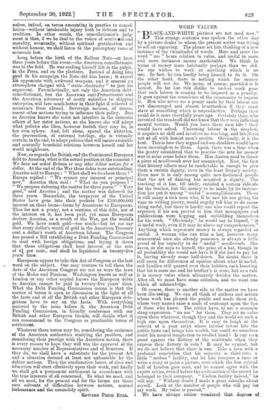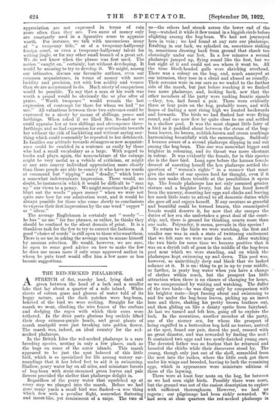WORD VALUES.
4
13 LACK-AND-WHITE pictures are not used now." This strange sentence was spoken the other day by a picture dealer to whom the present writer was trying to sell an engraving. The phrase set him thinking of a new instance of the vicissitudes of words. More and more the word " use " bears relation to value, and useful in more and more instances means marketable. We think in terms of money more habitually perhaps than we did. No one wishes to work at anything which is no use. In fact, he can hardly bring himself to do it. On the other hand, there is nothing which for money people will not do. We mean, of course, provided it is honest. So far has this dislike to useless work gone that such labour is ceasing to be imposed as a penalty. It goes against the conscience of the community to impose it. Men who never see a penny made by their labour are yet discouraged and almost heartbroken if they must slave at something which is unproductive. Perhaps they could do it more cheerfully years ago. Certainly those who invented the treadmill did not know that they were inflicting mental torture. Would you have these men idle ? they would have asked. Unearning labour is the simplest, it requires no skill and involves no teaching, and interferes not at all with honest men's profits. Obviously, it is the best. This is how they argued and our shudders would have been meaningless to them. Again, there was a time when the gentry considered that to practise the arts for money was in some sense below them. Miss Austen used to throw a piece of needlework over her manuscript. Now, the fact that literary efforts may be marketable is enough to give them a certain dignity, even in the least literary society. Even now it is only among quite new-fashioned people that the art of dancing has acquired a dignity. The teaching of it has, till lately, entailed a certain ridicule for the teacher, but the money to be made by its instruc- tion has put it among " useful " accomplishments. There is still many a rich man who, if he saw his son giving his time to writing poetry, would angrily tell him to do Bourse thing useful, but there is hardly one who would repeat tht. reproach if his son proved to him that newspapers and publications were begging and outbidding themselves for his work. "Obviously," he would say to himself, "it is useful work, even if it may be above my comprehension." Anything which represents money is always regarded as useful. A woman who can trim a hat, however many ornamental ones she already possesses, is always a little proud of her capacity to do " useful" needlework. She saves, so she says to herself, the price of a hat, though in all probability she would not have it if she had to pay for it, having already some half-dozen. No doubt there is still room for differences of opinion about what is useful, and families still quarrel over their hobbies, each boasting that his is some use and his brother's is none, but as a nil: it is money value which ultimately decides the matter. After all, we must have some criterion, and we want one which all acknowledge.
Of course, there is another side to the matter we have been discussing. We can all think of authors and artists whose work has pleased the public and made them rich, whose very names raise a smile of contempt upon the lips of those who know. The critics have, to use a common slang expression, "no use" for them. They set no value upon them whatever, though they and the world set such a high one upon themselves. It is easy to laugh at the conceit of a poor artist whose inferior talent hits the public taste and brings him wealth, but could we ourselves resist his mental temptation to swelled head ? Is any man proof against the flattery of the multitude when they express their flattery in coin ? It may be cynical, but we do not believe that there is one. Take a man with a profound conviction that his capacity is third-rate, a little " useless " facility, and let him compose a tune or write a story or paint a picture, over which the less critical half of London goes mad, and he cannot agree with the expert critics, even if before the acclamation of the crowd he belonged to their company. "Useless facility indeed," he will say. "Without doubt I made a great mistake about myself. Look at the number of people who will pay for my work. My value is proved." We have alwa,ys rather wondered that degrees of, appreciation are not expressed in terms of coin more often than they are. Two sums of money only are constantly used in a figurative sense to appraise worth. For instance, we telk with unconscious irony of "a twopenny title," or of a twopenny-halfpenny foreign court, or even a twopenny-halfpenny talent for writing jingle, or for any other small branch of a great art. We do not know when the phrase was first used. The notion "caught on," certainly, but without developing. It would be amusing to try to develop it. We might, among our intimates, discuss our favourite authors, even our common acquaintance, in terms of money with more lucidity and precision, yet with less acidity and venom than we are accustomed to do. Much nicety of comparison would be possible. To say that a man or his work was worth a pound would be obviously the ne plus ultra of praise. "Worth twopence" would remain the last expression of contempt for those for whom we had "no use." All valuations between these two extremes could be expressed to a nicety by means of shillings, pence and farthings. When asked if we liked Mrs. So-and-so we could appraise her at two shillings and elevenpence three- farthings, and so find expression for our sentiments towards her without the risk of backbiting and without saying any- thing which could reasonably be repeated to her detriment. In families our attitude towards strangers or new acquaint- ance could be confided in a sentence as easily by those who had a small vocabulary as a large. With regard to books and plays, again, the nomenclature of the coinage might be very useful as a vehicle of criticism, or might at any rate convey individual appreciation more clearly than those people are able to convey it who have no words at command but " ripping " and "deadly," which leave a somewhat indeterminate impression. There would, no doubt, be instances in which it would be difficult to "sum up" our views to a penny. We might sometimes be glad to blurt out the words "paper money" when we were not quite sure how far our admiration went, and it would be always possible for those who come slowly to conclusions to express their first impressions by the one word " copper" or "silver."
The average Englishman is certainly not "wordy "- he has "no use" for fine phrases, or rather, he thinks they should be confined to the silent domain of print. It is a thankless task for the few to try to correct the fashions. A good "choice of words" is still open to those who want them. There is no use in asking the average man to amuse himself by anxious selection. He would, however, we are sure, be open to some good advice on how to make the few he does use mean more if only some approved author in whom he puts trust would offer him a few more or less laconic suggestions.



































 Previous page
Previous page